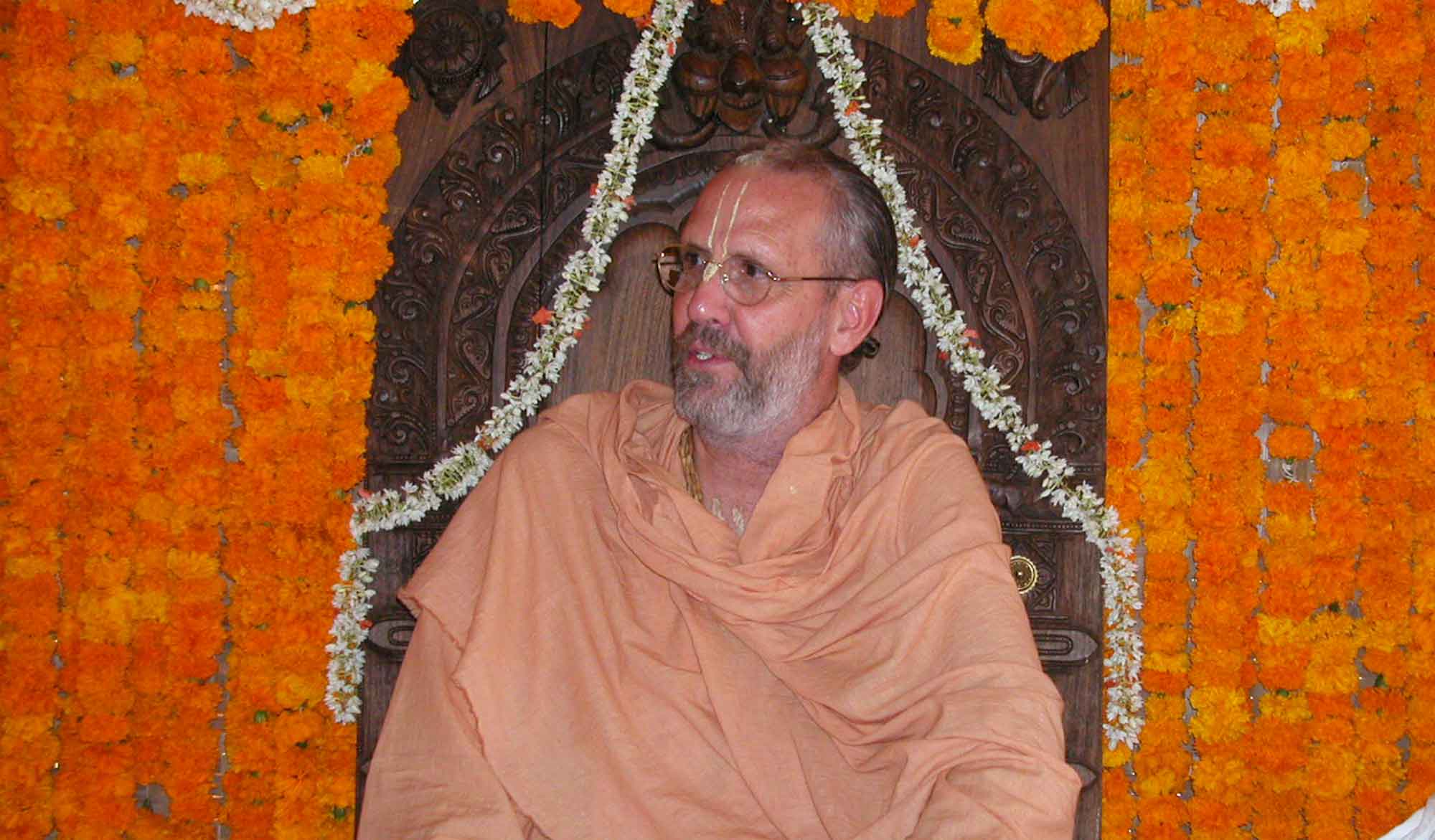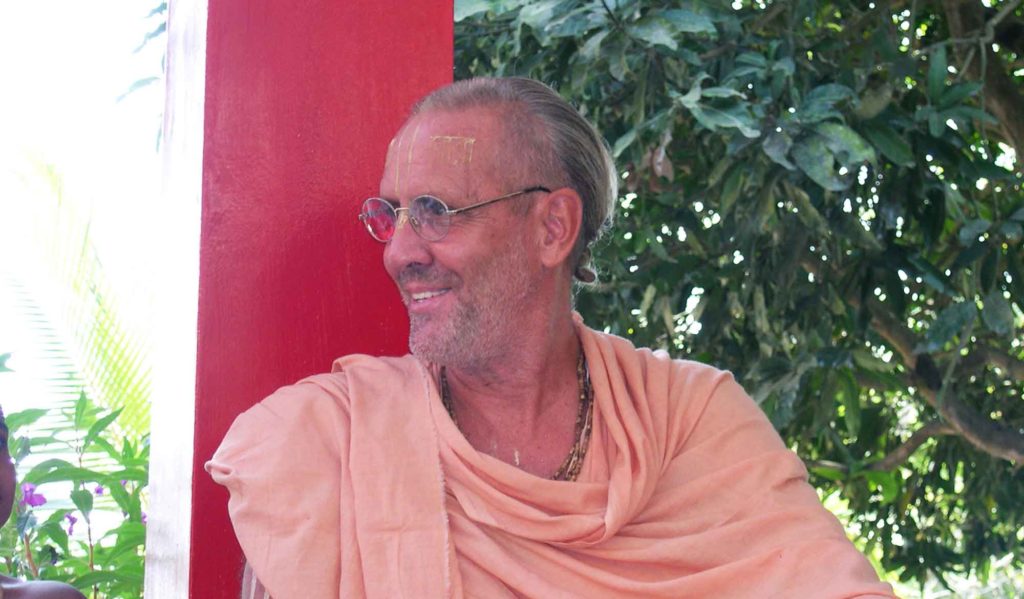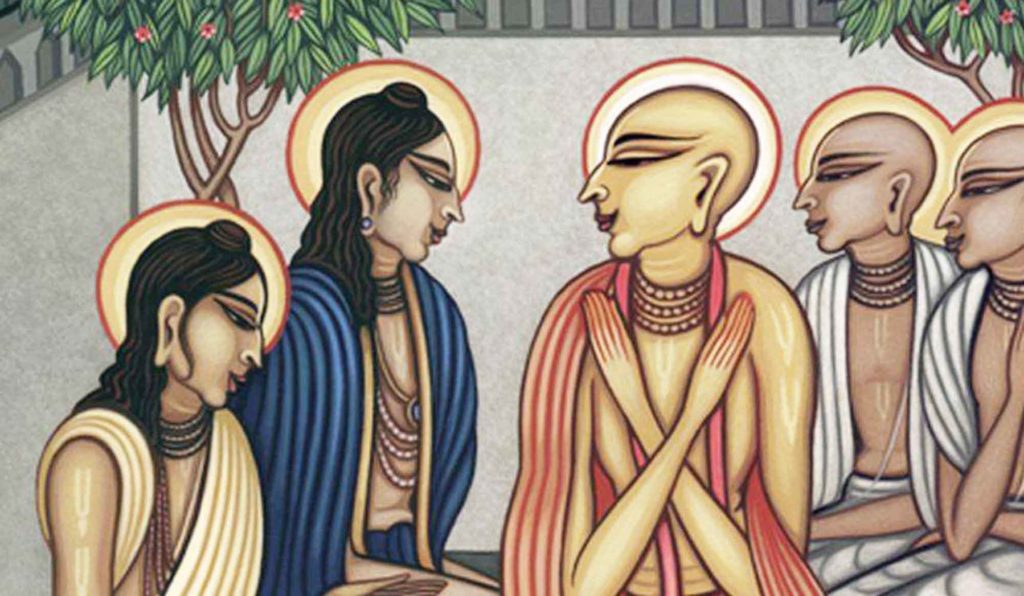Overview
'Inconceivable Topics' was written by Śrīla Narasiṅgha Mahārāja in Februrary 2005 in response to a devotee who claimed that the “fall of the jīva into this world is inconceivable.”
Question: I have heard it said recently by some devotees that the origin of the jīva (regarding the soul’s falling or not falling from the līlā of Kṛṣṇa) is inconceivable and that we cannot imagine or understand how or from where the soul has come into this material world. Can you please comment on this controversial topic?
Answer: With our tiny brains so many things in Kṛṣṇa consciousness are inconceivable. Not only is the origin of the soul inconceivable but Kṛṣṇa’s name, His form, qualities, and pastimes are all inconceivable to us. Who could conceive that the Absolute Truth (the source of all existence) is crawling as an infant child in the courtyard of Nanda Mahārāja or suckling the breast of Mother Yaśodā?
The great devotee, Raghupati Upadhyāya says:
śrutim apare smṛtim itare bhāratam anye bhajantu bhava-bhītāḥ
aham iha nandaṁ vande yasyālinde paraṁ brahma
“Those who are afraid of material existence worship the Vedic literature. Some worship smṛti, the corollaries to the Vedic literature, and others worship the Mahābhārata. As far as I am concerned, I worship Kṛṣṇa’s father, Mahārāja Nanda, in whose courtyard the Supreme Personality of Godhead, the Absolute Truth, is playing.”
That the Absolute Truth is crawling in the courtyard of Nanda Mahārāja is inconceivable to even the greatest thinkers that the world has ever known, but it is a fact.
When we rely on the capacity of our tiny brain then all such things may be inconceivable. Knowledge or proper understanding of the Absolute Truth is obtained through the descending process (avaroha) and not through the ascending process (aroha). Aroha depends on the mind and senses, which are inherently defective and thus knowledge obtained in this way is also defective or incomplete.
Avaroha means the process of receiving transcendental knowledge through the disciplic succession of self-realized souls. Such knowledge when received submissively enables one to understand the Absolute Truth.
The sound that comes to us through (disciplic succession) the process of avaroha is also called śabda-brahma or transcendental sound vibration that is not subject to bhrama (mistakes), pramāda (illusion), vipralipsā (cheating), or karaṇāpāṭava (imperfect perception).
On the other hand, any form of knowledge or understanding (particularly regarding the Absolute Truth) sought through the process of aroha is most certainly wrought with the four defects of bhrama, pramāda, vipralipsā, and karaṇāpāṭava.
If we want to know the origin of the soul or to understand the Supreme Personality of Godhead, we must first hear from authorities with faith (śraddhā). This is called śravaṇa-daśā, hearing from authorities with faith.
Then comes varaṇa-daśā, acceptance. When we faithfully hear from authorities the next natural step is to accept what the authorities have said. Only faith allows us to embrace transcendental knowledge. If for some reason we lack the essential faith and rely on our tiny brains for understanding, then the truth remains inconceivable and beyond our understanding or power of recognition. When we lack the proper faith then even after hearing the truth we will fail to recognize it.
Acceptance or varaṇa-daśā must be followed by sādhana-daśā, the stage of practice. Practice means to follow in the footsteps. This means that the knowledge from spiritual authorities must be followed and passed on to others without adding anything of our own concoction. What the self-realized authorities say we accept as truth.
Then we come to the stage of prāpana-daśā or attainment. In prāpana-daśā there is realization of the Absolute Truth. That which has been accepted on the basis of faith now becomes fully realized.
By the grace of our spiritual teachers we can accept the truth after hearing with faith and thus such matters as the inconceivable origin of the jīva can easily be understood even in our neophyte stage of spiritual life.
If we do not have real faith, then even after hearing the truth we will not accept it or embrace it fully. The issue of the origin of the jīva is only inconceivable in the minds of those devotees who have not embraced the transcendental knowledge passed down in our disciplic succession.
Our spiritual master Śrīla A.C. Bhaktivedanta Svami Prabhupāda has stated:
“The conclusion is that no one falls from the spiritual world, or Vaikuṇṭha planet, for it is the eternal abode.” (S.B. purport, 3.16.26)
Shortly before the close of Śrīla Prabhupāda’s manifest pastimes he left instruction that if his disciples had any questions regarding philosophy that they should approach his godbrother, Śrīla B.R. Śrīdhara Mahārāja.
As it turned out, the origin of the jīva and the jīvas falling or not falling from the spiritual world was one of the first philosophical questions to be raised after the departure of Śrīla Prabhupāda. Thus the disciples of Śrīla Prabhupāda approached his godbrother Śrīla B.R. Śrīdhara Mahārāja for clarification and instruction. Śrīla Śrīdhara Deva Goswami Mahārāja stated as follows:
“The brahma-jyoti, the non-differentiated marginal plane, is the source of infinite jīva souls, atomic spiritual particles of non-differentiated character. The rays of the Lord’s transcendental body are known as the brahma-jyoti, and a pencil of a ray of the brahma-jyoti is the jīva. The jīva soul is an atom in that effulgence, and the brahma-jyoti is a product of an infinite number of jīva atoms.
“Generally, souls emanate from the brahma-jyoti which is living and growing. Within the brahma-jyoti, their equilibrium is somehow disturbed and movement begins. From non-differentiation, differentiation begins. From a plain sheet of uniform consciousness, individual conscious units grow. And because the jīva is conscious it is endowed with free will. So, from the marginal position they choose either the side of exploitation or the side of dedication.
“Because the soul is very small, his freedom is also imperfect; a soul in the marginal position is very vulnerable. Freedom does not mean absolute freedom. Because the soul’s existence is small, his freedom is defective — there is the possibility of committing a mistake. Freedom of the minute soul does not mean perfect freedom. Complete freedom would be perfect reality, but the minute soul is endowed with the smallest atomic freedom. This is the position of the atoms of consciousness, and this is why they are vulnerable. They may judge properly or improperly; that is the position of those who are situated in the marginal position. If the soul were not endowed with the freedom to determine his position, we would have to blame God for our suffering. But we cannot blame God. The starting point of the soul’s suffering is within himself.” (Śrī Kṛṣṇa – Reality the Beautiful, ch-4, Origin of the Soul)
When approached about this subject, Śrīla Śrīdhara Mahārāja made no reference whatsoever to the jīva ever having been in the līlā of Kṛṣṇa before his having fallen down to this material world. Rather Śrīla Śrīdhara Mahārāja makes it quite clear that the jīva originates in the marginal plane of existence.
This is called śrota-panthā, hearing and accepting knowledge through the disciplic succession. Those who struggle with embracing the proper Gaudiya Vaiṣṇava siddhānta regarding to origin of the soul (as described above) are either the victims of a poor fund of faith or they are simply suffering from the reactions of Vaiṣṇava aparādha.
When we lack the essential faith to hear from authorities about the knowledge pertaining to even the simplest truth (as the jīva issue) then what chance do we stand to understand the higher līlās of Rādhā and Kṛṣṇa in Vṛndāvana, where every word is a song and every step is a dance and from where once having gone no one ever returns.
Related Articles
- The Insanity of Inquiry by Śrīla Bhakti Rakṣaka Śrīdhara Deva Gosvāmī
- Anādi (For Advanced Philosophers) by Śrīla Bhakti Rakṣaka Śrīdhara Deva Gosvāmī
- Inconceivable Topics by Śrīla Bhakti Gaurava Narasiṅgha Mahārāja
- Love of God is Dormant in the Heart of the Jīva by Śrīla Bhakti Gaurava Narasiṅgha Mahārāja
- Jīvas and the Marginal Plane by Śrīla Bhakti Gaurava Narasiṅgha Mahārāja
- The Blame Game by Gaura Gopāla Dāsa
- Jivera Dayā (Mercy to the Living Entities) by Śrīla Bhaktivinoda Ṭhākura
Prema Dhāma Deva Stotram with the Narasiṅgha Sevaka Commentary – Verses 61-65
In verses 61 to 65 of 'Prema Dhāma Deva Stotram', Śrīla Śrīdhara Mahārāja narrates the pastime of Śrī Caitanya at Caṭaka Parvata In Purī and explains how the scriptures produced by Brahmā and Śiva are ultimately searching for the personality of Mahāprabhu who is merciful too all jīvas, no matter what their social position.
Prabhupāda Śrīla Sarasvatī Ṭhākura’s Visit to Ayodhyā
With the forthcoming observance of Śrī Rāma Navamī, we present 'Prabhupāda Śrīla Sarasvatī Ṭhākura’s Visit to Ayodhyā' written by Śrīla Bhaktisiddhānta Sarasvatī Ṭhākura Prabhupāda from The Gaudīyā magazine, Vol 3. Issue 21/ In December 1924, after visiting Benares and Prāyāga, Sarasvatī Ṭhākura visited the birth-site of Śrī Rāmācandra in Ayodhyā.
Śaraṇāgati – The Only Path to Auspiciousness
In this article, 'Śaraṇāgati - The Only Path to Auspiciousness', Dhīra Lalitā Dāsī analyses the process of śaraṇāgati (surrender) beginning with śraddhā (faith). She also discusses the role of śāstra and the Vaiṣṇava in connection with surrender.
Ātma Samīkṣā – The Value of Introspection
In this article, "Ātma Samīkṣā – The Value of Introspection" Kalki Dāsa highlights the importance of introspection in the life of a devotee and especially in relation to the worldly environment that surrounds us. He also explains how transcendental sound influences our capacity to introspect.
Prema Dhāma Deva Stotram with the Narasiṅgha Sevaka Commentary – Verses 61-65
In verses 61 to 65 of 'Prema Dhāma Deva Stotram', Śrīla Śrīdhara Mahārāja narrates the pastime of Śrī Caitanya at Caṭaka Parvata In Purī and explains how the scriptures produced by Brahmā and Śiva are ultimately searching for the personality of Mahāprabhu who is merciful too all jīvas, no matter what their social position.
Prabhupāda Śrīla Sarasvatī Ṭhākura’s Visit to Ayodhyā
With the forthcoming observance of Śrī Rāma Navamī, we present 'Prabhupāda Śrīla Sarasvatī Ṭhākura’s Visit to Ayodhyā' written by Śrīla Bhaktisiddhānta Sarasvatī Ṭhākura Prabhupāda from The Gaudīyā magazine, Vol 3. Issue 21/ In December 1924, after visiting Benares and Prāyāga, Sarasvatī Ṭhākura visited the birth-site of Śrī Rāmācandra in Ayodhyā.
Śaraṇāgati – The Only Path to Auspiciousness
In this article, 'Śaraṇāgati - The Only Path to Auspiciousness', Dhīra Lalitā Dāsī analyses the process of śaraṇāgati (surrender) beginning with śraddhā (faith). She also discusses the role of śāstra and the Vaiṣṇava in connection with surrender.
Ātma Samīkṣā – The Value of Introspection
In this article, "Ātma Samīkṣā – The Value of Introspection" Kalki Dāsa highlights the importance of introspection in the life of a devotee and especially in relation to the worldly environment that surrounds us. He also explains how transcendental sound influences our capacity to introspect.








